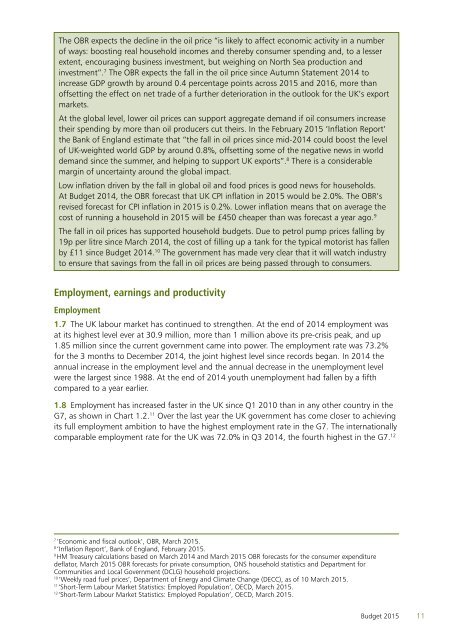Create successful ePaper yourself
Turn your PDF publications into a flip-book with our unique Google optimized e-Paper software.
The OBR expects the decline in the oil price “is likely to affect economic activity in a numberof ways: boosting real household incomes and thereby consumer spending and, to a lesserextent, encouraging business investment, but weighing on North Sea production andinvestment”. 7 The OBR expects the fall in the oil price since Autumn Statement 2014 toincrease GDP growth by around 0.4 percentage points across <strong>2015</strong> and 2016, more thanoffsetting the effect on net trade of a further deterioration in the outlook for the UK’s exportmarkets.At the global level, lower oil prices can support aggregate demand if oil consumers increasetheir spending by more than oil producers cut theirs. In the February <strong>2015</strong> ‘Inflation Report’the Bank of England estimate that “the fall in oil prices since mid-2014 could boost the levelof UK-weighted world GDP by around 0.8%, offsetting some of the negative news in worlddemand since the summer, and helping to support UK exports”. 8 There is a considerablemargin of uncertainty around the global impact.Low inflation driven by the fall in global oil and food prices is good news for households.At <strong>Budget</strong> 2014, the OBR forecast that UK CPI inflation in <strong>2015</strong> would be 2.0%. The OBR’srevised forecast for CPI inflation in <strong>2015</strong> is 0.2%. Lower inflation means that on average thecost of running a household in <strong>2015</strong> will be £450 cheaper than was forecast a year ago. 9The fall in oil prices has supported household budgets. Due to petrol pump prices falling by19p per litre since March 2014, the cost of filling up a tank for the typical motorist has fallenby £11 since <strong>Budget</strong> 2014. 10 The government has made very clear that it will watch industryto ensure that savings from the fall in oil prices are being passed through to consumers.Employment, earnings and productivityEmployment1.7 The UK labour market has continued to strengthen. At the end of 2014 employment wasat its highest level ever at 30.9 million, more than 1 million above its pre-crisis peak, and up1.85 million since the current government came into power. The employment rate was 73.2%for the 3 months to December 2014, the joint highest level since records began. In 2014 theannual increase in the employment level and the annual decrease in the unemployment levelwere the largest since 1988. At the end of 2014 youth unemployment had fallen by a fifthcompared to a year earlier.1.8 Employment has increased faster in the UK since Q1 2010 than in any other country in theG7, as shown in Chart 1.2. 11 Over the last year the UK government has come closer to achievingits full employment ambition to have the highest employment rate in the G7. The internationallycomparable employment rate for the UK was 72.0% in Q3 2014, the fourth highest in the G7. 127‘Economic and fiscal outlook’, OBR, March <strong>2015</strong>.8‘Inflation Report’, Bank of England, February <strong>2015</strong>.9HM Treasury calculations based on March 2014 and March <strong>2015</strong> OBR forecasts for the consumer expendituredeflator, March <strong>2015</strong> OBR forecasts for private consumption, ONS household statistics and Department forCommunities and Local Government (DCLG) household projections.10‘Weekly road fuel prices’, Department of Energy and Climate Change (DECC), as of 10 March <strong>2015</strong>.11‘Short-Term Labour Market Statistics: Employed Population’, OECD, March <strong>2015</strong>.12‘Short-Term Labour Market Statistics: Employed Population’, OECD, March <strong>2015</strong>.<strong>Budget</strong> <strong>2015</strong>11


